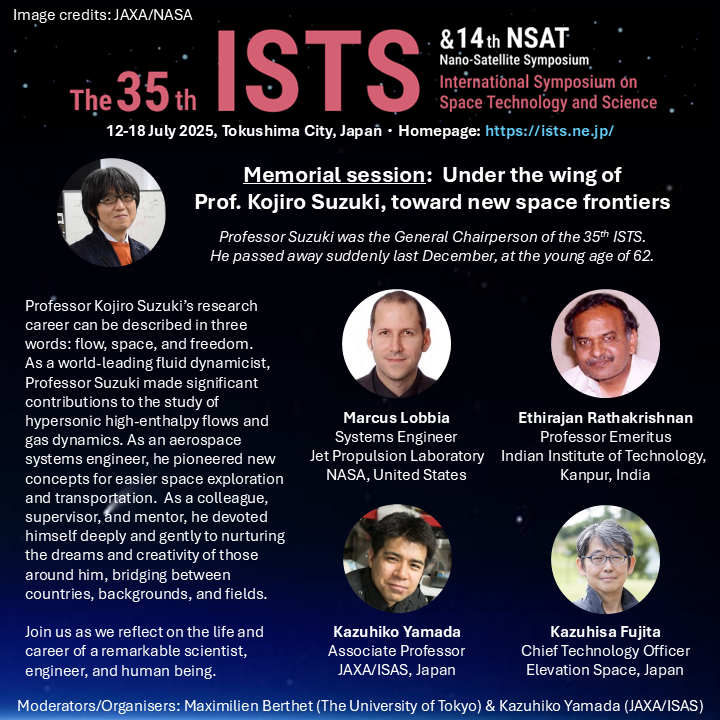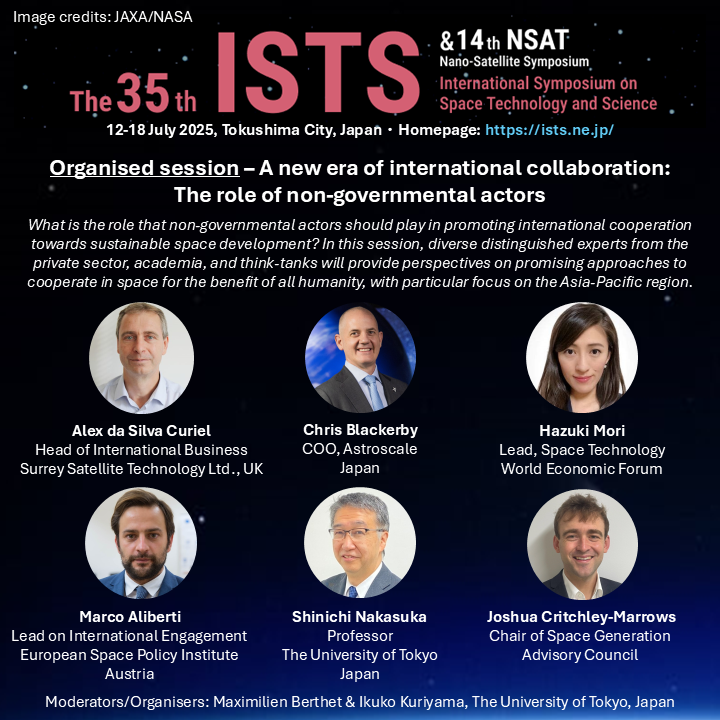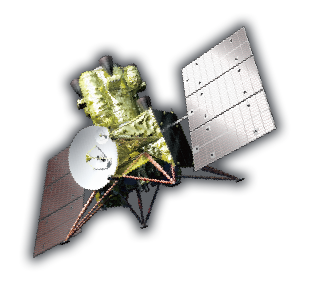Special Sessions
・Special Program 1: World Space Highlight
Date: July 14 (Mon.) 10:30 – 12:00
Place: Arena (1F)
Moderator: Katsumi Onoda (JAXA)
Speakers:
(NASA)・ (DLR) ・ (CNES)・TBC
This session will inspire all audience the importance of collaboration between various actors (agencies, institutes, academia and private sectors) towards future space exploration which is in line with the theme of ISTS “More Mobile Together:Ride on Our Fantastic Vehicle to New Space Frontiers” The background of this session is growing global interests in international space exploration. All speakers will introduce their roadmaps of each organization towards future space exploration and its good practices of collaboration with various private sectors.
・Keynote Speech: “More Mobile Together:Ride on Our Fantastic Vehicle to New Space Frontiers”.TBC
Date: July 14 (Mon.) 14:00 – 15:45
Place : Arena (1F)
Moderator: Prof.Shujiro Sawai (General Chairperson of the 35th ISTS)
14:00 – 14:45 Keynote speech1 (Title TBD) Speakers: Prof.Yasuhiro Morita (rocketlink)
15:00 – 15:45 Keynote speech2 (Title TBD) Speakers: Prof.Shinichiro Sakai(JAXA)(SLIM)
・Special Session 2/Memorial session:Under the wing of Prof.Kojiro Suzuki, Toward New Space Frontiers

Date: July 14 (Mon.) 16:30 – 17:30
Place : Arena (1F)
Moderators: Maximilien Berthet
Speakers:
・Marcus Lobbia : Systems Engineer Jet Propulsion Laboratory, NASA, United States
“Perspectives as a past graduate student of Prof. Kojiro Suzuki”
・Ethirajan Rathakrishnan: Professor Emeritus Indian Institute of Technology,Kanpur, India
“Professor Suzuki and Hypersonic Flow”
・Kazuhiko Yamada: Associate Professor JAXA/ISAS, Japan
“Research and develop activity on the inflatable aeroshell atmospheric-entry technology.
~Start from preliminary study, challenge to flight demonstration and future vision~”
・Kazuhisa Fujita : Chief Technology Officer Elevation Space, Japan
Professor Kojiro Suzuki was the General Chairperson of the 35th ISTS, and Professor in the Graduate School of Frontier Sciences at The University of Tokyo. He passed away suddenly last December, at the young age of 62.
A special session will be held in his memory at the 35th ISTS, on Monday 14 July, 16:30-17:30. It will be open to the public.
Professor Suzuki’s research career can be described in three words: flow, space, and freedom. As a world-leading fluid dynamicist, Professor Suzuki made significant contributions to the study of hypersonic high-enthalpy flows and gas dynamics. As an aerospace systems engineer, he pioneered new concepts for easier space exploration and transportation. As a colleague, supervisor, and mentor, he devoted himself deeply and gently to nurturing the dreams and creativity of those around him, bridging between countries, backgrounds, and fields.
Join us as we reflect on the life and career of a remarkable scientist, engineer, and human being. Presentations by close colleagues of Professor Suzuki will be accompanied by pre-recorded messages and videos.
Organise Session
・OS1: Sustainable Space Transportation for the Next-Generation
Date: Jul 15 (Tue.) 9:00 – 10:40
Place: Arena (1F)
Organizer: Yusuke Maru (JAXA/ISAS)
OS2 July 15/Tus. 11:00-12:40, International Collaboboration
Objectives & Overview
A new era of international collaboration in space has taken root, in which academia and industry are more prominent than ever before. In parallel, sustainable use of outer space has become the common global challenge facing all space actors. For instance, in 2024 the UN Summit of the Future adopted the Pact for the Future, inviting the contribution of the private sector, civil society, and other stakeholders to international discussion for ensuring sustainability of outer space. Given this new reality, what is the role that non-governmental actors should play in promoting international cooperation towards sustainable space development? In this session, diverse distinguished experts from the private sector, academia, and think-tanks will provide perspectives on promising approaches to cooperate in space for the benefit of all humanity, with particular focus on the Asia-Pacific region.
Organisers/Moderators
- Maximilien Berthet, Department of Aeronautics and Astronautics, The University of Tokyo, Japan.
- Ikuko Kuriyama, Institute for Future Initiatives, The University of Tokyo, Japan.
Speakers
- Alex da Silva Curiel, Head of International Business, Surrey Satellite Technology Ltd (SSTL), UK.
“Lessons learned from over 20 international space mission partnerships”
- Marco Aliberti, Lead on International Engagement, European Space Policy Institute (ESPI), Austria.
“Non-Governmental Pathways to Space Diplomacy: The Power of Ideas and Think Tanks”
- Chris Blackerby, COO, Astroscale, Japan.
“Satellite Servicing: Ensuring Security and Expanding Economies in Orbit”
- Hazuki Mori, Lead, Space Technology, World Economic Forum.
“Overview of the Space Activities of the World Economic Forum”
- Joshua Critchley-Marrows, Chair of Space Generation Advisory Council (SGAC).
“The role of the next generation in shaping international collaboration”
- Shinichi Nakasuka, Professor, Department of Aeronautics and Astronautics, The University of Tokyo, Japan.
“University community for space activities – UNISEC-GLOBAL Challenge”

OS3 July. 15/Tus. 14:00-17:40, Nutrition and Food Production in Space
In space missions, such as those involving space shuttles and the International Space Station, food supply has primarily relied on transportation from Earth. Currently, as part of human space exploration, long-term habitation plans on the Moon and Mars are being advanced worldwide. In these cases, there are numerous challenges, such as the long time required for food supply from Earth and limitations on the amount of food that can be transported. Therefore, it is essential to produce food on the Moon or Mars.
On the Moon and Mars, various environmental factors that affect food production, such as gravity, atmospheric pressure, atmospheric composition, temperature, humidity, light, and water availability, differ from those on Earth. Any issues with these factors could hinder physical activities or food production. Just as different regions on Earth have their own dietary habits and foods suited to their climates, space facilities are also likely to develop unique food cultures and methods of food production.
In this session, experts active both domestically and internationally will introduce the kinds of diets that should be adopted or the types of food that should be produced in the
space environment.
概要:スペースシャトルや国際宇宙ステーション等での宇宙滞在のおける食料供給は、基本的に地上からの輸送に頼ってきた。現在、有人宇宙開発として、月や火星での長期滞在計画が世界的に進められている。この場合、地球からの食糧供給は、輸送時間がかかりすぎることや輸送量に制限があることなどの課題が多い。このため、月や火星で食料を生産することが必要になってくる。月や火星では、重力、気圧、大気の成分、温度、湿度、光、水分などの食料生産に影響する多くの環境因子が地球上と異なり、どの因子に問題があっても身体活動や食料生産の障害となりうる。また、地上においてもそれぞれの風土にあった食習慣や食料があるように、宇宙施設内においてもそれぞれ独特の食生活や食料生産方法があるはずである。本セッションでは、宇宙環境においてどのような食事を摂るべきか、あるいは、どのような食料を生産すべきかについて国内外で活躍されている方々に紹介してもらう。
内容
Chairpersions: Professor Yoshiaki Kitaya (Osaka Metropolitan University)
Professor Takeshi Nikawa (Tokushima University)
Opening Remarks (5 min)
- Space Nutrition & Life Science in Space (1演題、20 min including discussion)
Tatsuya Shimizu(Tokyo Women’s Medical University, shimizu.tatsuya@twmu.ac.jp)
Circular Cell Culture System Using Microalgae and Animal Cells for Future Space Food
Nobuyo Tsuboyama-Kasaoka (National Institutes of Biomedical Innovation, Health and Nutrition, ntsubo@nibiohn.go.jp)
Frontiers in Disaster Nutrition and Space Nutrition
Stephane Blanc (CNRS, Stephane.BLANC@cnrs-dir.fr)
Energy and subtrate metabolism during spaceflights and analogs. ーInferences for health on Earthー
Takeshi Nikawa, Katsuyuki Miyawaki, Takahiko Watanabe, Taro Mito, and
Akira Takahashi (Institute of Space Nutrition & Medicine, Tokushima Univ. nikawa@tokushima-u.ac.jp)
Anti-muscle atrophic protein food source in space: Development of a recirculatory
rearing system for soybeans and crickets
休憩 (10 min)
- Food Production in Space (1演題、20 min including discussion)
Chen Xi, Kaoru Yoshiyama (Okamoto), Genji Kamada, Haruo Kasahara, Daisuke Masuda, Toru Shimazu, Kana Kuriyama, Kazumi Koga, Tomokazu Yamazaki, Noriko Matsuzaki, Akira Higashibata, Jun Hidema (Research Center for Space Agriculture and Horticulture, Chiba University, j.hidema@chiba-u.jp)
Study on plant responses against the stresses of microgravity and high ultraviolet
radiation in space
Yoshiaki Kitaya (Osaka Metropolitan University, Japan, kitaya@omu.ac.jp)
Sweetpotato culture in space farming in CELSS
Toshiro Kaneko, Daiki Suzuki, Shota Sasaki, Atsushi Higashitani(Graduate School of Engineering, Tohoku University, kaneko@tohoku.ac.jp)
Plasma-Synthesized Dinitrogen Pentoxide for Rice Cultivation on Lunar Farms
Guillemette Gauquelin-Koch (CNES, Guillemette.gauquelinkoch@cnes.fr):
Nutrition in Space
Closing Remarks (5 min)


